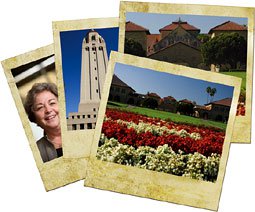Stanford University: Where Theory and Practice Meet
In the field from day one.

At the Stanford Teacher Education Program (STEP), a twelve-month master's program atStanford University, in Palo Alto, California,theory and practice don't merely coexist; theyactively and continually inform each other.
Not only does coursework overlap with clinicalwork (homework assignments for the Curriculum andInstruction course, for instance, often include planningthe next lesson in a real classroom), but STEPstudents also benefit from devoted professionalswhose job is to make those connections seamless.
Cooperating teachers at partnering K-12schools, STEP faculty, and STEP supervisorsmake up a trio of mentors for the program'sinductees. Between weekly meetings,constant feedback, and continual communicationand reflection, "you couldn'tfall through the cracks here, even if youwanted to," explains Rachel Lotan, STEP'ssecondary-education director.
Students begin fieldwork on the first dayand continue daily throughout the year, but"we're not just put in the water and told to swim,"says Pablo Aguilera, a 2007-08 candidate. "Theyease us into it."
Candidates' responsibilities slowly build up overthe academic year and, in partnership with a cooperatingteacher, culminate in a full-time takeover of his or her classroom.Students continually learn by doing. "Honestly, I thinkyou can make people go to school for five years and tell them toread any number of books, but they won't really learn anythinguntil they're in an actual classroom," Aguilera says.
At STEP, a commitment to serving traditionally underservedurban student populations, as well as an emphasis on personalizedlearning and education-reform initiatives, is paramount. Programleaders aim to prepare not only excellent teachers but also agents ofchange in education. STEP, therefore, makes sure to cultivate theseideals within its growing network of reform-oriented professional-developmentschools, where candidates do their real-world training.These teachers share a unified vision for urban-school reform, including anemphasis on community connections and the importance of smaller schools.
So far, prospects look good. For example, graduation and college-entrancerates at the East Palo Alto Academy, a charter high schooloperated by Stanford Schools Corporation and one of the localprofessional-development schools for STEP students, have increaseddramatically.
The unity of vision draws STEP students to each other, aswell. Surveys of graduates reveal that more than 90 percentmaintain contact with individuals in their cohort, evenyears later. Many graduates seek employment alongsideother graduates, and continue their professionaldevelopment in partnership with STEP.More than 50 percent of cooperating teachersare also STEP graduates. All thesefactors makes the program's cheerymantra, "Once a STEPie, always aSTEPie," a fitting one.
Vital Stats
- Location: Palo Alto, California
- Degrees conferred: Combined bachelor's/master's (elementary only); master's
- Annual graduating class: 90
- Time in the field: 40 weeks, plus 1 week of planning with cooperating teachers
- Highlights:
- Close integration of theory and practice
- Emphasis on urban and multicultural settings
- Professional-development schools
- Field work begins on first day